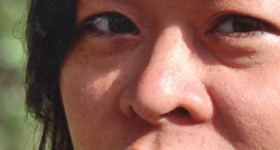Writer John Derbyshire. Photo from Wikipedia.
It wasn't
until I read Sally Kohn's remarkable
piece on Colorlines in
response to John Derbyshire's blatantly racist children's field guide for
avoiding black people that I actually had the courage to read the now-fired National Review writer's essay, "The
Talk: Nonblack Version." I
say "courage" because for a writer to be
released from The National
Review staff, I must assume that the piece is far beyond the average Hyphen
reader's conception of egregiousness.
It is.
Hats off to
Kohn for combating Derbyshire's laundry list of "facts" that regurgitate
the tenets of biological racism and tips for instilling in children an
irrational fear of people with dark skin, tips that he says "may save
their lives." Kohn does this with thoughtful, smart explanations of
racism, privilege, and the social and political constructs of race. She arms
her daughter with knowledge and hope for eventual justice for all Americans,
not terror and hatred for a villainized and generalized race of people. She
writes not just with her own child in mind, but with Trayvon Martin in her
heart, for Derbyshire's essay was a direct response to (and appalling mockery
of) several published pieces from black writers -- including KJ Dell'Antonia in The
New York Times and Darryl E.
Owns in The
Orlando Sentinel -- who talk
about explaining the dangers of racism and racial profiling to their children.
I'm not here
to duplicate any of Kohn's points, as she -- and likely others -- have written
effective and moving counter pieces. I'm here to talk about two words, seven
measly letters from Derbyshire's essay that made my reading experience become
even more dreadful:
"You
don’t have to follow my version of the talk point for point; but if you are
white or Asian and have kids, you owe it to them to
give them some version of the talk. It will save them a lot of time and trouble
spent figuring things out for themselves. It may save their lives."
Now, some may think Derbyshire is only addressing his children who happen to be of mixed white and Asian ancestry [thanks to one of our readers for the link] and perhaps I'm looking too much into the semantics, but to me, it appears that this advice extends beyond his own brood. Unless he always refers to his children as "white or Asian at home? Now I'm trying to stop myself from thinking about the racial dynamics in the Derbyshire home...
The reality is that adults are predominantly reading this essay anyway. Derbyshire's
letter was not just a guide for his own family on how to plan social events around possible mass gatherings of African Americans, how to move
out of districts with black political leadership, and how to view themselves as victims of innate hostility from black people, which are just three of fifteen despicable pointers.
Apparently, he has us other Asians in mind as well. It is certainly the most dubious
of honors.
The
conservative courtship of Asian Americans -- casting us as
model bootstrap-pullers who need no public
assistance -- is old, as is the pitting of Asians versus blacks in a relationship far more complex than racial reductionists would like you to think. Just
recently, Marion Barry's comments about Asian-owned businesses in his DC ward
made headlines. Irreverent NYC restaurateur (and Taiwanese American) Eddie Huang said he could
understand the intent behind Barry's overall argument -- though, hopefully, not
his word-choice of "dirty" to describe Asian shops. Huang
commented on the "carpetbagger" techniques of some Asian business
owners who will open up in a low-income neighborhood populated heavily by
blacks and Latinos but refuse to live there, as well as the insult of
installing bulletproof Plexiglas walls at the register to separate employees
from customers. On the other hand, last year's Capital
New York profile of a Chinese
family under frequent violent attack both in their restaurant and while out on
delivery in the predominantly black and Latino Mott Haven neighborhood was
heartbreaking and eye-opening. These are experiences that make up the
complicated, multilayered history of these groups in the US, exploited by those
who find it politically advantageous to see conflict between the two.
And it works.
The Asian Small Business Owner v. Black Customer serves as a perpetual racial
trope -- without much structural change to ease problems in low-income urban
America -- in our present-day narrative, stretching back
to Brooklyn,
1990 and Los
Angeles, 1992. Underlying the black/Asian conflict in the latter city was
an even older and more persistent trope: Driving While Black, which has since
become Walking While Black in light of the killings of Sean Bell and Trayvon
Martin or Sleeping While Black if you're Kenneth
Chamberlain. All stem from the fact that simply Being Black was once
justification enough for death and persecution. Asian Americans and African
Americans have different histories but we also share parallels, and our
struggles are not entirely independent of each other. This should be echoed
each time these difficult discussions about race take place, whether we are
involved directly or simply exist as a two-word reference in a bigoted public
treatise.
Derbyshire's
essay delivers a troublesome reminder of where Asian Americans fit (or are put,
rather) in America's bipolar racial paradigm. In the context of requiring
"saving" from blacks, Derbyshire nestles us up close to his
whiteness, conservatism, and virulent racism. Yet to many politicians, our
names confound
them, our civil rights are of no consequence if we are undocumented (or, historically, even if we are citizens), and our faces are used
to promote anti-China campaign
fodder. With his inclusion of Asian Americans in his letter to white
parents, Derbyshire hopes that we (or at least his Asian American family members and followers)
have conveniently forgotten this as well as our common threads with other
marginalized communities, the necessity of being allies, and, apparently, our inclination to not be extremely hateful people. But we must not forget.
Oddly, I am
glad that Derbyshire directed this letter -- even ever so quietly -- to Asian
Americans. It gave this Asian American a reason to write about the effects of
Martin's killing, an issue that has been portrayed as a black/white, an issue
that up until this point I had grieved about silently. The next step? Not needing to hear "Asian" before speaking out on an issue in the
future.
This post has been edited from its original version.










Comments
Thanks for the link. It could just be an issue of semantics but I read "but if you are
white or Asian and have kids" as a larger address beyond his own family.